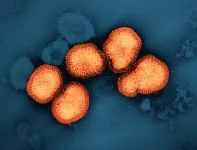(Press-News.org) Researchers from Western and Brown University have made groundbreaking progress towards identifying the root cause and potential therapy for preeclampsia.
The pregnancy complication affects up to eight per cent of pregnancies globally and is the leading cause of maternal and fetal mortality due to premature delivery, complications with the placenta and lack of oxygen.
The research, led by Drs. Kun Ping Lu and Xiao Zhen Zhou at Western, and Drs. Surendra Sharma and Sukanta Jash at Brown, has identified a toxic protein, cis P-tau, in the blood and placenta of preeclampsia patients.
According to the study published in Nature Communications, cis P-tau is a central circulating driver of preeclampsia – a “troublemaker” that plays a major role in causing the deadly complication.
“The root cause of preeclampsia has (so far) remained unknown, and without a known cause there has been no cure. Preterm delivery is the only life-saving measure,” said Lu, professor of biochemistry and oncology at Schulich School of Medicine & Dentistry. Lu is also a Western Research Chair in Biotherapeutics.
“Our study identifies cis P-tau as a crucial culprit and biomarker for preeclampsia. It can be used for early diagnosis of the complication and is a crucial therapeutic target,” said Sharma, who recently retired from his Brown roles as a professor of pathology and laboratory medicine (research) and professor of pediatrics (research).
In 2016, Sharma, a leading preeclampsia researcher, and his team had identified that preeclampsia and diseases like Alzheimer’s had similar root causes related to protein issues. This research builds on that finding.
Until now, cis P-tau was mainly associated with neurological disorders like Alzheimer’s disease, traumatic brain injuries (TBI) and stroke. This association was discovered by Lu and Zhou in 2015 as a result of their decades of research on the role of tau protein in cancer and Alzheimer’s.
An antibody developed by Zhou in 2012 to target only the toxic protein while leaving its healthy counterpart unscathed is currently undergoing clinical trials in human patients suffering from TBI and Alzheimer’s Disease. The antibody has shown promising results in animal models and human cell cultures in treating the brain conditions.
The researchers were curious whether the same antibody could work as a potential treatment for preeclampsia. Upon testing the antibody in mouse models they found astonishing results.
“In this study, we found the cis P-tau antibody efficiently depleted the toxic protein in the blood and placenta, and corrected all features associated with preeclampsia in mice. Clinical features of preeclampsia, like elevated blood pressure, excessive protein in urine and fetal growth restriction, among others, were eliminated and pregnancy was normal,” said Sharma.
Sharma and his team at Brown have been working on developing an assay for early detection of preeclampsia and therapies to treat the condition. He believes the findings of this study have brought them closer to their goal.
Black and Hispanic women more susceptible
The tragic death of American track and field champion Tori Bowie earlier this year put the spotlight on preeclampsia, which disproportionately impacts Black and Hispanic women.
A gold, silver and bronze medalist in the 2016 Olympic Games, Bowie, 32, was found dead in her bed on May 2, 2023, while approximately eight months pregnant. According to the autopsy report the complications may have involved eclampsia—a severe form of preeclampsia.
“Research has shown that women of certain races have genes that could possibly lead to higher than average blood pressure levels, eventually creating conditions for preeclampsia during pregnancy. However, it’s also true that in many low socio-economic countries there’s no registry to record PE cases. So, its link to other environmental factors is still unclear,” said Sharma.
Preeclampsia and the brain
Recent research has also thrown light on preeclampsia’s long-term impacts and possible links to brain health.
“Preeclampsia presents immediate dangers to both the mother and fetus, but its long-term effects are less understood and still unfolding,” said Sharma. “Research has suggested a heightened risk of dementia later in life for both mothers who have experienced preeclampsia and their children.” However, the causal link between preeclampsia and dementia is not known.
The researchers say this new study has pinpointed a potential underlying cause of the complex relationship between preeclampsia and brain health.
“Our study adds another layer to this complexity. For the first time, we’ve identified significant levels of cis P-tau outside the brain in the placenta and blood of preeclampsia patients. This suggests a deeper connection between preeclampsia and brain-related issues,” said Jash, the lead author of the study.
As researchers delve deeper, how our bodies respond to stress is also emerging as a potential factor in the onset of preeclampsia.
“Although genetics play a role, factors like stress could be an important piece of the puzzle. Understanding how stress and other environmental factors intersect with biological markers like cis P-tau may offer a more complete picture,” said Jash, assistant professor of molecular biology, cell biology and biochemistry (research) and pediatrics (research) at Brown.
A stress-response enzyme called Pin1
In 1996 and 1997, Lu and Zhou made the groundbreaking discovery of Pin1, which turns out to be a stress-response enzyme. This is a specific protein in the cells that becomes active or changes its behaviour in response to stressors, such as environmental challenges, toxins or physiological changes.
“Pin1 plays a pivotal role in keeping proteins, including the tau protein, in the functional shape during stress. When Pin1 becomes inactivated, it leads to the formation of a toxic, misshapen, variant of tau – cis P-tau,” said Zhou, associate professor, pathology and laboratory medicine at Schulich Medicine & Dentistry.
Interestingly, Pin1 is a key player in cancer signalling networks, turning on numerous cancer-causing proteins and turning off many cancer-suppressing ones. Found in high levels in most human cancers, it’s particularly active in cancer stem cells, which are thought to be central to starting and spreading tumors and are hard to target with existing treatments.
“Essentially, when Pin1 is activated, it can lead to cancer. On the other hand, when there’s a decrease or deactivation in Pin1, it results in the formation of the toxic protein cis P-tau, which leads to memory loss in Alzheimer’s and after TBI or stroke. Now, we’ve uncovered its connection to preeclampsia as well,” said Zhou.
“The results have far-reaching implications. This could revolutionize how we understand and treat a range of conditions, from pregnancy-related issues to brain disorders,” said Lu.
Lu and Sharma had met at Brown in 2019, where Lu was invited to give a lecture on his research. Following an engaging session and a few dinners together, a collaboration between the Western researchers and Brown was forged.
“Science surprises us. I had never thought of working on finding a therapy for preeclampsia. It also shows that a collaboration can be transformative.”
END
In major breakthrough, researchers close in on preeclampsia cure
Antibody developed by Western researchers, currently undergoing trials to treat traumatic brain injuries and Alzheimer's, could help diagnose and treat preeclampsia
2023-09-15
ELSE PRESS RELEASES FROM THIS DATE:
Facebook's design makes it unable to control misinformation
2023-09-15
WASHINGTON (September 15, 2023) – As misinformation flourished online during the Covid-19 pandemic, a number of platforms announced policies and practices aimed at combating the spread of misinformation. Did those efforts work?
New research published today in Science Advances suggests that the Covid-19 vaccine misinformation policies of Facebook, the world’s largest social media platform, were not effective in combating misinformation. The study, led by researchers at the George Washington University, found that Facebook’s efforts were undermined by the core design features ...
Study shows replanting logged forests with diverse mixtures of seedlings accelerates restoration
2023-09-15
Twenty-year experiment finds that active replanting beats natural recovery for restoring logged tropical forests.
The higher the diversity of replanted tree species, the more quickly canopy area and biomass recovered.
Results emphasize the importance of preserving biodiversity in pristine forests and restoring it in recovering logged forest.
Satellite observations of one of the world’s biggest ecological experiments on the island of Borneo have revealed that replanting logged forests with diverse mixtures of seedlings can significantly accelerate their recovery. The results have been published today in the journal Science Advances.
The ...
NIH clinical trial of universal flu vaccine candidate begins
2023-09-15
Enrollment in a Phase 1 trial of a new investigational universal influenza vaccine candidate has begun at the National Institutes of Health’s Clinical Center in Bethesda, Maryland. The trial is sponsored by the National Institute of Allergy and Infectious Diseases (NIAID), part of the NIH, and will evaluate the investigational vaccine for safety and its ability to elicit an immune response.
Currently available seasonal influenza (or “flu”) vaccines are effective at preventing specific strains of influenza. Each year, the vaccines are re-evaluated and changed to best match the strains of flu predicted to be the most dominant in the upcoming flu ...
UMass Amherst neuroscientist aims to advance knowledge of human brain development by mapping the sea slug brain
2023-09-15
A University of Massachusetts Amherst neuroscientist has been awarded a $3.1 million grant from the National Institute of Neurological Disease and Stroke to advance knowledge on human brain development by using an unusual subject: the brain of the sea slug.
This tiny invertebrate is an ideal candidate to study for brain development because it adds a countable number of neurons to its brain – the number increases more than 40-fold in less than eight weeks to a total of about 10,000 neurons – while the animal grows and performs behaviors, ...
No pollen, no seeds
2023-09-15
North Carolina State University researchers have successfully transferred an important gene from one compartment of a plant cell to another to produce tobacco plants that lack pollen and viable seeds, while otherwise growing normally. Their findings could lead to better ways of producing hybrid seeds to maximize crop productivity, or to introduce seedlessness in fruit species lacking the often-desired trait, such as raspberries, blackberries or muscadine grapes.
The researchers began the work in the energy-producing portion of a cell, the mitochondria. In plants, aberrations within the mitochondrial genome can be associated with ...
Hydroelectric power plants in Brazil threaten turtles that depend on rapids, study warns
2023-09-15
A research project supported by FAPESP shows that the construction of new hydroelectric power plants in Brazil’s South region could have an impact on more than 30% of the habitat of Phrynops williamsi, the Williams’ side-necked turtle. The species occurs only in areas of Atlantic Rainforest and Pampa (the grassland biome adjacent to Brazil’s border with Uruguay and Argentina), and is classed as “Vulnerable” (facing a high risk of extinction) by the International Union for Conservation of Nature (IUCN).
An article on the study is published in the Journal of Applied Ecology by ...
NIH awards $13.7 million grant to BU researchers investigating genetics of Alzheimer’s disease
2023-09-15
(BOSTON)—The National Institutes of Health/National Institute on Aging recently awarded a $13.7 million grant to a project led by Boston University Chobanian & Avedisian School of Medicine principal investigators Lindsay Farrer, PhD, chief of biomedical genetics and distinguished professor of genetics, and Richard Sherva, PhD, assistant professor of medicine in biomedical genetics, for research using whole genome sequencing and other approaches to identify genetic factors for Alzheimer disease (AD) in Jews currently living in ...
Purdue researcher awarded $1.3 million for malaria drug trials in Southeast Asia and Africa
2023-09-15
WEST LAFAYETTE, Ind. – A Purdue researcher is taking a giant leap forward in the fight against drug-resistant strains of malaria in developing countries.
Open Philanthropy has awarded $1.38 million to Philip Low to further validate a drug therapy that he and his colleagues have previously shown to successfully treat the disease. Low (rhymes with “now”) is Purdue University’s Presidential Scholar for Drug Discovery and the Ralph C. Corley Distinguished Professor of Chemistry in the College of Science.
For years, experts ...
Study: No evidence that YouTube promoted anti-vaccine content during COVID-19 pandemic
2023-09-15
CHAMPAIGN, Ill. — New research led by data science experts at the University of Illinois Urbana-Champaign and United Nations Global Pulse found that there is no strong evidence that YouTube promoted anti-vaccine sentiment during the COVID-19 pandemic.
The study, published in the Journal of Medical Internet Research, performed an algorithmic audit to examine if YouTube’s recommendation system acted as a “rabbit hole,” leading users searching for vaccine-related videos to anti-vaccine content.
For the study, the researchers asked World Health Organization-trained participants and workers from Amazon Mechanical Turk to intentionally ...
New ways to predict outcomes of pregnancies with fetal growth problems
2023-09-15
A team of scientists, led by researchers at UCL, have developed new methods to predict outcomes for pregnancies where there are issues with poor growth of the baby inside the womb.
The research, published in the Journal of Clinical Investigation, involved 142 women from the EVERREST Prospective Study* who had severe early-onset fetal growth restriction (FGR) – meaning their babies were very small on ultrasound scans early in the second half of pregnancy (between 20 and 27 weeks).
Fetal growth restriction affects approximately ...
LAST 30 PRESS RELEASES:
Scientists discover why we know when to stop scratching an itch
A hidden reason inner ear cells die – and what it means for preventing hearing loss
Researchers discover how tuberculosis bacteria use a “stealth” mechanism to evade the immune system
New microscopy technique lets scientists see cells in unprecedented detail and color
Sometimes less is more: Scientists rethink how to pack medicine into tiny delivery capsules
Scientists build low-cost microscope to study living cells in zero gravity
The Biophysical Journal names Denis V. Titov the 2025 Paper of the Year-Early Career Investigator awardee
Scientists show how your body senses cold—and why menthol feels cool
Scientists deliver new molecule for getting DNA into cells
Study reveals insights about brain regions linked to OCD, informing potential treatments
Does ocean saltiness influence El Niño?
2026 Young Investigators: ONR celebrates new talent tackling warfighter challenges
Genetics help explain who gets the ‘telltale tingle’ from music, art and literature
Many Americans misunderstand medical aid in dying laws
Researchers publish landmark infectious disease study in ‘Science’
New NSF award supports innovative role-playing game approach to strengthening research security in academia
Kumar named to ACMA Emerging Leaders Program for 2026
AI language models could transform aquatic environmental risk assessment
New isotope tools reveal hidden pathways reshaping the global nitrogen cycle
Study reveals how antibiotic structure controls removal from water using biochar
Why chronic pain lasts longer in women: Immune cells offer clues
Toxic exposure creates epigenetic disease risk over 20 generations
More time spent on social media linked to steroid use intentions among boys and men
New study suggests a “kick it while it’s down” approach to cancer treatment could improve cure rates
Milken Institute, Ann Theodore Foundation launch new grant to support clinical trial for potential sarcoidosis treatment
New strategies boost effectiveness of CAR-NK therapy against cancer
Study: Adolescent cannabis use linked to doubling risk of psychotic and bipolar disorders
Invisible harms: drug-related deaths spike after hurricanes and tropical storms
Adolescent cannabis use and risk of psychotic, bipolar, depressive, and anxiety disorders
Anxiety, depression, and care barriers in adults with intellectual and developmental disabilities
[Press-News.org] In major breakthrough, researchers close in on preeclampsia cureAntibody developed by Western researchers, currently undergoing trials to treat traumatic brain injuries and Alzheimer's, could help diagnose and treat preeclampsia





